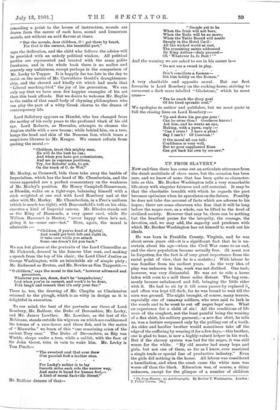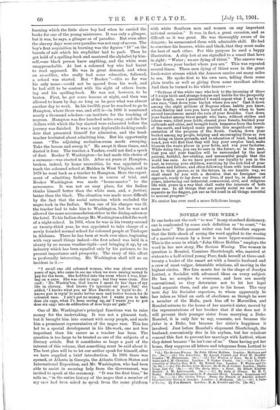UP FROM SLAVERY.* Now and then there has come out
an articulate utterance from the dumb multitude of slave races, but the occasion has been rare, and we know of none that has been quite so character- istic as this. Mr. Booker Washington tells a very remarkable life-story with singular fairness and self-restraint, it may be that the charitable breadth with which he regards the past becomes optimism when he speculates on the future. Possibly he does not take due account of facts which are adverse to his hopes; there are some observers who fear that it will be long before the negro race, as a whole, can be lifted to the level of civilised society. However that may be, there can be nothing but the heartiest praise for the integrity, the courage, the devotion, and, we may add, the sagacity and prudence with which Mr. Booker Washington has set himself to work out his ideals.
He was born in Franklin County, Virginia, and he was about seven years old—it is a significant fact that he is un- certain about his age—when the Civil War came to an end, and the slave population became actually free. (It must not be forgotten, for the fact is of very great importance from the racial point of view, that he is a mulatto.) With labour he was familiar from his earliest years. As the very idea of play was unknown to him, work was not disliked. One task, however, was very distastefuL He was set to ride a horse laden with corn to a mill three miles distant. The bag corn. monly became unbalanced and fell, bringing the little rider with it. He had to sit by it till some passer-by replaced it, and often was kept till dark, for he was bound to wait till the corn was ground. The night brought, of course, many terrors, especially one of runaway soldiers, who were said to lurk in the woods and to be wont to cut off negro boys' ears. What an experience for a child of six! All the conditions of life were of the roughest, not the least painful being the wearing of a flax shirt, his solitary garment,—a new flax shirt, he tells us, was a torture surpassed only by the pulling out of a tooth. An older and hardier brother would sometimes take off the edge of the suffering by wearing it for a few days,—this brother, one is glad to hear, is now a highly-valued helper in his work. But if the slavery system was bad for the negro, it was still worse for the white. "My old master had many boys and girls, but not one of them, so far as I know, ever mastered a single trade or special line of productive industry." Even the girls did nothing in the house. All labour was considered a humiliation, and when the crash came the white man was worse off than the black. Education was, of course, a thinir. unknown, except for the glimpse of a, number of children
• Up frora Slavery: an Autobiography. By Booker T. Washington. London : T. Fisher Unwin.
learning which the little slave boy had when he carried the books for one of the young mistresses. It was only a glimpse, but it was, he says, a glimpse as of paradise. But even after the slavery days were over paradise was not easy of access. The boy's first acquisition in learning was the figures " 18 " on the barrels of salt -which his stepfather had to pack. Then he got hold of a spelling-book and mastered the alphabet by him- self,—no black person knew anything, and the white were unapproachable. At last a coloured boy who had learnt to read appeared. He was in great demand, and when an ex-soldier, who really had some education, followed, a school was started. But " Booker "—this so far was his only name—could not be spared from his work, and he had still to be content with the sight of others learn- ing and his spelling-book. He was not, however, to be beaten. First, he got some lessons at night, and then was allowed to learn by day, so long as he gave what was almost another day to work. In his twelfth year he resolved to go to Hampton, where there was, and still is—in 1896 it numbered nearly a thousand scholars—an institute for the teaching of negroes. Hampton was five hundred miles away, and the few dollars with which the boy started were exhausted before the journey was finished. It was a very deplorable-looking candi- date that presented himself for admission, and the head- teacher hesitated about admitting him. But his opportunity came. "The adjoining recitation-room needs sweeping. Take the broom and sweep it." He swept it three times, and dusted it four. The teacher, a Yankee, could not find a speck of dust. Booker T. Washington—he had made this choice of a surname—was started in life. After six years at Hampton, broken, indeed, by home necessities, he was appointed to
teach the coloured school at Malden in West Virginia, and in 1879 he went back as a teacher to Hampton. Here the experi- ment of admitting Indians was in course of trial, and Booker Washington was made "house-master" to the newcomers. It was not an easy place, for the Indian thinks himself better than the white man, and, a fortiori, better than the black. The situation was made more difficult
by the fact that the social ostracism which excluded the negro took in the Indian. When one of his charges was ill,
the teacher had to take him to Washington, but he was not allowed the same accommodation either in the dining-saloon or the hotel. To his Indian charge Mr. Washington added the work
of a night-school. In 1881, when he was in his twenty-second or twenty-third year, he was appointed to take charge of a newly founded normal school for coloured people at Tuskegee in Alabama. There he has been at work ever since, beginning with very small things indeed—the first school was held in a shanty by no means weather-tight—and bringing it up, by an industry which has been equalled only by his patience, to its present importance and prosperity. The story of this effort is profoundly interesting. Mr. Washington shall tell us an incident in it :—
. " I recall one old coloured woman, who was about seventy years of age, who came to see me when we were raising money to pay for the farm. She hobbled into the room where I was, lean- ing on a cane. She was clad in rags ; but they were clean. She said : • Mr. Washin'ton, God knows I spent de bes' days of my . life in slavery. God knows I's ignorant an' poor ; but,' she added, I knows what you an' Miss Davidson is tryin' to do. I knows you is try in' to make better men and better women for de coloured race. I ain't got no money, but I wants you to take dese six eggs, what I's been saving up, an' I wants you to put dese six eggs into de eddication of dese boys an' gals.'
One of Mr. Washington's principal functions was to raise money for the undertaking. It was not a pleasant task, but it brought him into contact with many people, and made him a prominent representative of the negro raze. This has led to a special development in his life-work, one not less
important than his career as a teacher has been. The question is too large to be treated as one of the subjects of a literary article. But it constitutes so large a part of the
interest of this volume, that something must be said about it.
The best plan will be to let our author speak for himself, after we have supplied a brief introduction. In 1895 there was opened, at Atlanta in Georgia, the Atlanta Cotton States and International Exposition, and Mr. Washington, who had been able to assist in securing help from the Government, was invited to speak at the ceremony. "It was the first time," he
tells us, !` in the entire history of the negro that a member of any race had bezn asked to speak from the same Folatforol with white Southern men and women on any important national occasion." It was, in fact, a great occasion, and as difficult as it was great. He was thoroughly aware of its dangers ; he surmounted them with admirable skill. He had to convince his hearers, white and black, that they must make the best of each other. For this pprpose he used a happy illustration. A ship lost at sea signalled to a vessel that hove in sight: " Water ; we are dying of thirst." The answer was : "Cast down your bucket where you are." This was repeated several times. These men dying of thirst were in the great fresh-water stream which the Amazon carries out many miles to sea. He spoke first to his own race, telling them some plain truths as well as giving them some excellent advice. And then he turned to his white hearers :— "To those of the white race who look to the incoming of those of fereign birth and strange tongue and habits for the prosperity of the South, were I permitted I would repeat what I say to my own race, 'Cast down your bucket where you are.' Cast it down among the eight millions of Negroes whose habits you know, whose fidelity and love you have tested in days when to have proved treacherous meant the ruin of your firesides. Cast down your bucket among these people who have, without strikes and labour wars tilled your fields, cleared your forests, builded your railroads arid cities, and brought forth treasures from the bowels of the earth, and helped make possible this magnificent repre- sentation of the progress of the South. Casting down your bucket among my people, helping and encouraging them as you are doing on these grounds, and to education of head, hand, and heart, you will find that they will buy your surplus land, make blossom the waste places in your fields, and run your factories. While doing this, you can be sure in the future, as in the past, that you and your families will be surrounded by the most patient, faithful, law-abiding, and unresentful people that the world has seen. As we have proved our loyalty to you in the past, in nursing your children, watching by the sick-bed of your mothers and fathers, and often following them with tear-dimmed eyes to their graves, so in the future, in our humble way, we shall stand by you with a devotion that no foreigner can approach, ready to lay down our lives, if need be, in defence of yours, interlacing our industrial, commercial, civil, and religious life with yours in a way that shall make the interests of both races one. In all things that are purely social we can be as separate as the fingers, yet one as the hand in all things essential to mutual progress."
No orator has ever used a more felicitous image.







































 Previous page
Previous page